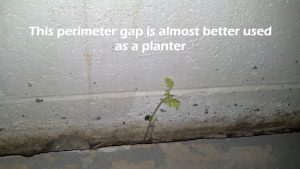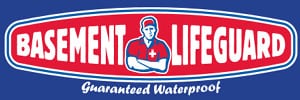You should always be sure that your gutters are clean. If there is a blockage, the rain water can cascade over the gutter and fall against your foundation, flooding the area. The downspout should carry the water at least 5 feet away from the foundation. The further, the better. If it is not being carried away far enough, then your whole roof is being funneled right against your foundation. The grading around your foundation should always be pitched away so water does not lay against the foundation. If these common sense items are met, and you still have a wet basement, you need a french drain system.
Ask the Guard - Basement Waterproofing FAQs
Water enters a basement in two fundamental ways. Lateral seepage is due to outside soils allowing collected water to find weaknesses in the foundation and exploit them. Cracks, block cavities, window wells, etc. The other way is through hydrostatic pressure. This is the static water table that is under your house. It’s level will rise against your floor and force water through crack, holes, and most commonly at the edge of the floor against the wall, or the cove. Our systems are designed along the floors perimeter in a trench roughly a foot deep and against the wall. This allows exceptional water capture from both water entry types.
A basement water leak can decrease the resale value of your home by 25%. If you’re like most of us, your home is your biggest investment and asset. I’m sure you want to make sure you get a good return when you sell. A wet basement is also much harder to sell when a perspective buyer has other homes to consider with nicer basements. New home buyers aren’t looking for projects like this to tackle right after they move in. Most realtors will also advise that repairing your basement water leak first is a recoverable expense.
It may start with a little dampness and end up as your worst nightmare. Unfortunately, a basement water leak never goes away on its own, it just gets worse. Ignoring the situation cannot only cause adverse health effects for you and your family, but it will cost you more money and aggravation in the long run. Wet basements can create rotted wood, insect problems, and electric wiring concerns. They also breed health issues. Even if you don’t spend much time in the basement, it can still affect the air quality in the rest of the house. If you’re not sure about what you’re seeing/smelling, we’d be happy to give you a free expert opinion.
- We use a PVC perforated triple wall pipe and others use a corrugated ABS. The PVC is more crush resistant and has a smooth bottom which can help water flow better and prevent sediment build up.
- We line the trench with a fabric called non-woven geotextile fabric to filter the water entering the trench’s stone and pipe. Others may wrap the pipe in a sock filter which leaves the stone unprotected and can decompose within 10 years or so.
- We use the most dependable sump pump on the market. Zoeller sump pumps.
- Block walls always get weep holes and are not an option or upgrade.
- And of course there’s always unparalleled craftsmanship of installation.
This is a fair and common question because most people don’t have much experience getting this work done. In any industry there is always the low bid and the high bid. We pride ourselves on usually being toward the middle. The high bid is reserved for high pressure salesmen that employ scare tactics and are commission driven. The low bids are given by desperate, uninsured companies or individuals that don’t pay taxes, use poor products or use subcontractors (installers that get a 1099 form). Surprisingly, several larger companies fall into both of those categories of high and low bid.
Our prices vary due to several factors. For a full perimeter french drain system with sump pit and pump in an average sized home, the cost can run between $5,000 and $8,000. Crawlspaces tend to cost more than standard basement system of the same size. We do offer free estimates.
First of all, the salesman is the owner. Mike comes out to introduce himself and listens to you describe the issues you’ve been seeing. He performs an inspection and, based on your observations and his inspection, renders his recommendation with a proposal. Every home is different so the systems that we install are customized to meet the individual problem. There are NO high pressure sales here. We take the time to answer any questions or concerns.
Normally the works lasts 3-4 days. We always want to make sure that the job gets done perfectly, so if a difficulty arises, the extra time is taken to do it right. NO shortcuts!
Perimeter Gap, Is this an acceptable water mitigation solution?

Many people think they have a French drain when they see a perimeter gap. It’s a common false sense of security. They can only handle very small amounts of water, if at all. They are easily contaminated and do nothing to relieve walls. They handle water once it’s within 2” from the floor. They were installed to help prevent floors from cracking, not mitigate the water.
